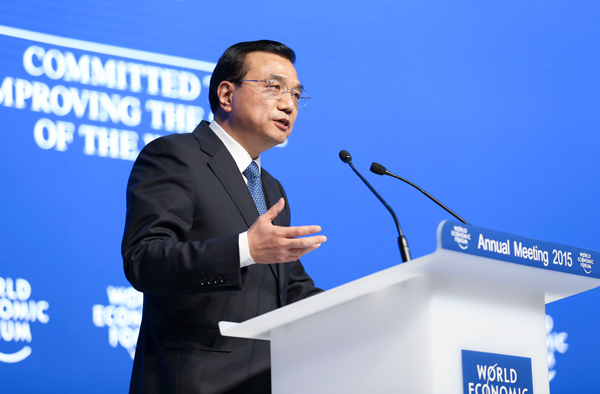 |
|
Premier Li Keqiang addresses the World Economic Forum's annual meeting in Davos on January 21, 2015. LIU ZHEN / CHINA NEWS SERVICE |
A more liberalized market and government reforms, the two engines highlighted by Premier Li Keqiang at the World Economic Forum in Davos, Switzerland, on Jan 21, are expected to help China avoid the middle-income trap on its way to a high-income society.
The key message of Li's long speech was how China would perform in the face of an economic slowdown and low-quality economic structure. Although people want to know whether and how China would be able to beat the middle-income trap, in which some Latin American economies were caught toward the end of the 20th century, Li used humor to provide an answer.
He said Davos is a beautiful town. In the past, it was famous for producing penicillin to cure lung diseases. Now, it is famous for providing an intellectual platform to nurture the brain. The difficult and complicated situation in today's world implies that "we now need a different kind of penicillin".
Apart from prescribing a new type of penicillin to cure China's economic ills, Li used the term "double middle-high" to describe China's medium-term development goal. "Double middle-high" means the slowing of economic growth from high speed to middle-high speed and the change in economic structure from low quality to middle-high quality.
Li said China had two choices: using "strong stimulation", as it did in the past, to achieve high growth, or maintaining mid-high-level growth without "irrigating the soil with too much water", a Chinese metaphor for uncontrolled quantitative easing to keep growth rates high. His choice: "We certainly opt for the latter."
But achieving a middle-high growth rate and creating an economic structure of middle-high quality is no easy task. Li shared with the delegates to the World Economic Forum what China would do to achieve this goal.
China's growth rate of 7.4 percent last year was still the highest among the major economies, and it was achieved without strong stimulation, Li said. Also, China created more than 13 million jobs last year, which was a record.
He indicated China would avoid getting into any regional and systematic economic or financial crisis. Since the inflation rate in 2014 was only 2 percent, there is room for some stimulation measures, and the use of 70 percent of local debts for building infrastructure has provided an important base for further growth.

I’ve lived in China for quite a considerable time including my graduate school years, travelled and worked in a few cities and still choose my destination taking into consideration the density of smog or PM2.5 particulate matter in the region.